The other day a friend emailed me asking if I’d ever seen behavior where Google’s autocomplete suggestions would change based on a prior query.

I’ve seen search results change based on prior queries but I couldn’t recall the autocomplete suggestions changing in the way he detailed. So I decided to poke around and see what was going on. Here’s what I found.
Query Dependent Autocomplete Example
Here’s the example I was sent. The individual was cleaning up an old computer and didn’t quite know the purpose of a specific program named ‘WineBottler’.

Quickly understanding that he didn’t need this program anymore he began to search for ‘uninstall winebottler’ but found that Google’s autocomplete had beat him to it.

There it was already listed as an autocomplete suggestion. This is very different from doing the uninstall query on a fresh session.

I was intrigued. So I started to try other programs in hopes of replicating the query dependent functionality displayed. I tried ‘SnagIt’ and ‘Photoshop’ but each time I did I got the same generic autocomplete suggestions.
Query Class Volume
Coincidentally I was also chatting with Barbara Starr about an old research paper (pdf) that Bill Slawski had brought to my attention. The subject of the paper was in identifying what I call query classes, or a template of sorts, which is expressed as a root term plus a modifier. Easy examples might be ‘[song] lyrics’ or ‘[restaurant] menu’.
So what does this have to do with autocomplete suggestions? Well, my instinct told me that there might be a query class of ‘uninstall [program]’. I clicked over to Ubersuggest to see if I just hadn’t hit on the popular ones but the service was down. Instead I landed on SERPs Suggest which was handy since it also brought in query volume for those autocomplete suggestions.
I searched for ‘uninstall’ and scrolled to where the results were making the most sense to me.
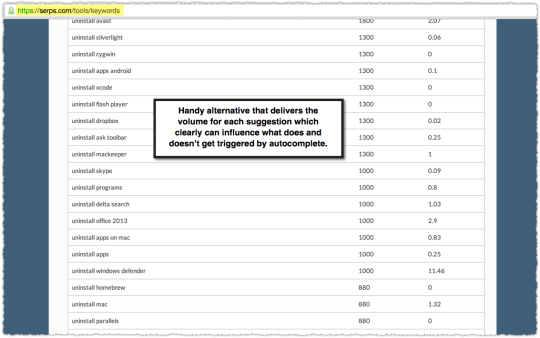
Quite obviously there is a query class around ‘uninstall [program]’. Now it was time to see if those with high volume (aka intent) would trigger the query class based autocomplete suggestions.
Query Class Based Autocomplete Suggestions
The scourge of the pop-under world, MacKeeper, jumped out at me so I gave that one a try.
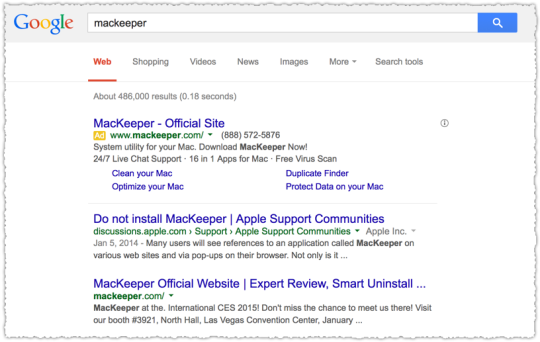

Sure enough the first autocomplete suggestion is uninstall mackeeper. It’s also interesting to note the prior query is kept in reference in the URL. This isn’t new. It’s been like that for quite some time but it makes this type of scenario far easier to explain.
At random I tried another one from my target list.
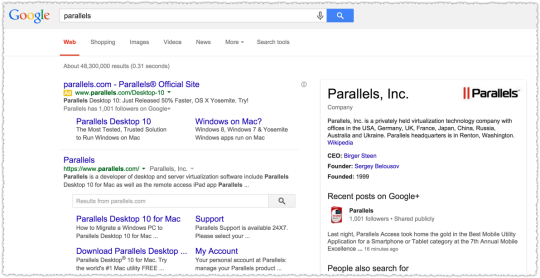
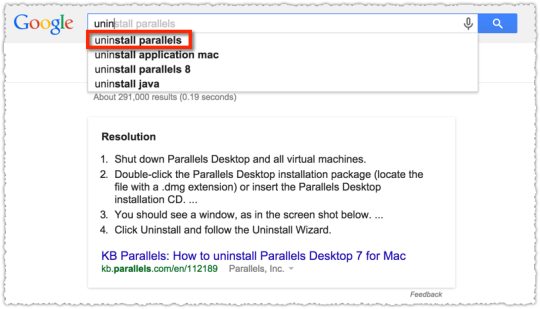
Yup. Same thing.
Classes or Attributes?
It got me thinking though whether it was about query classes or just attributes of an entity. So I poked around a bit more and was able to find examples in the health field. (Sorry to be a debbie downer.) Here’s a search for lymphoma.

Followed by a search for treatment.

This differs from a clean search for ‘treat’.

Treatment is an attribute of the entity Lymphoma. Then again ‘treatment of [ailment]’ is also a fairly well-defined query class. So perhaps I’m splitting hairs in trying to pry apart classes from attributes.
It Doesn’t Always Work
I figured I could find more of these quickly and selected a field that I thought had many query classes: music. Search for a band, then search for something like ‘tour dates’ or ‘tickets’ and see if I could get the query dependent autocomplete suggestions to fire.
I tried Kasabian.
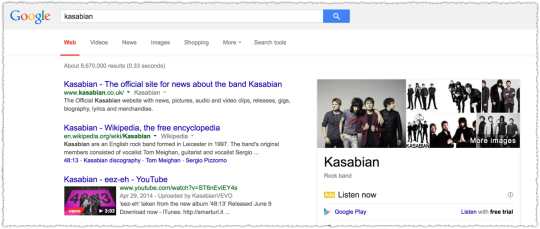
And then tour dates.

Nothing about Kasabian at all. Just generic tour dates autocomplete suggestions. I tried this for many other artists including the ubiquitous Taylor Swift and got the same results, or lack thereof.
I had a few theories of why music might be exempted but it would all just be conjecture. But it did put a bit of a dent into my next leap in logic, which would have been to conversational search.
Not Conversational Search
One of the bigger components of Hummingbird was the ability to perform conversational search that, often, wouldn’t require the user to reference the specific noun again. The classic example being ‘How tall is the Eiffel Tower?’ ‘Who built it?’
Now in the scheme of things conversational search is, in part, built upon identifying query classes and how people string them together in a query session. So it wouldn’t be a shock if this started showing up in Google’s autocomplete suggestions. Yet that’s not what appears to be happening.
Because you can do a voice search using Google Now for ‘Kasabian’ and then follow up with ‘tickets for them’ and get a very different and relevant set of results. They figure out the pronoun reference and substitute appropriately to generate the right query: ‘Kasabian Tickets’.
What Does Google Say?
Of course it pays to see what Google says about their Autocomplete suggestions predictions.
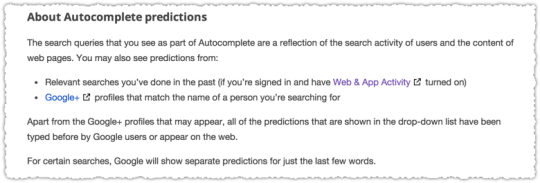
I find it interesting that they call them predictions and not suggestions. It’s far more scientific. More Googly. But I’m not changing my references throughout this piece!
But here we can see a probable mash-up of “search activity of users” (aka query classes) and “relevant searches you’ve done in the past” (aka query history). Previously, the query history portion was more about ensuring that my autocomplete for ‘smx’ might start with ‘smx east’.

While the autocomplete for someone unaffiliated with search wouldn’t get that suggestion.

So I’m left to think that this new session based autocomplete personalization is relatively new but may have been going on for quite some time without many people noticing.
There’s a lot more research that could be done here so please let me know if and when you’ve noticed this feature as well as any other examples you might have of this behavior.
For Google the reason for doing this is easy. It’s just one more way that they can reduce the time to long click.
TL;DR
Google is personalizing autocomplete suggestions based on a prior query when it matches a defined query class or entity attribute.
The Next Post: We Want To Believe
The Previous Post: Image Blind

5 trackbacks/pingbacks
Comments About Google Autocomplete Query Personalization
// 17 comments so far.
Tom Davenport // January 15th 2015
Wow. Time for a keyword tool where you put in entities, and it spits out attributes.
In fact, it’s been time for that for too long.
AJ Kohn // January 15th 2015
Yes Tom I think we’d all benefit from a robust ontology tool!
Alessio Madeyski // January 15th 2015
Hey AJ,
wow, very interesting.
I tried to replicate this using Google.it in Italy, but for now I’m not seeing what you are observing here.
I’ll keep an eye on it.
AJ Kohn // January 15th 2015
Alessio,
Ah, well you know who Google is. They treat anything outside of .com as step-children who only get the hand-me-downs after they’ve been worn for a while. Hopefully they move the functionality to international sites soon. I do wonder if the same query classes are as evident in other languages. I assume they are but it may take time for them to resolve them all.
Jeanie Walker // January 15th 2015
First, thanks for starting my day off with a Logan’s Run visual reference. Next, outstanding work – I’m sure for every comment you receive thanking you for your insights, there are *at least* another 50 who are silently thanking you. This looks like another piece of their semantic search puzzle.
Hope this finds you in good health. ~ Jeanie
AJ Kohn // January 15th 2015
Thanks Jeanie though … that’s actually Lucifer from the original Battlestar Galactica. But Logan’s Run … I might have to dig up a visual for a future post. (Love that book and dig the movie!)
It’s definitely another interesting piece of things and shows that they’re working hard to predict those next searches. Many thanks for the well wishes and kind words.
Nate Johnson // January 15th 2015
Fantastic article! I loved how you broke it down with great examples… So I was curious since Kasabian doesn’t have a huge following in relation to some other bands and tried the following:
Searched “Pearl Jam”
Then when I started my search for Tour Dates I noticed that after I hit “t” the third suggested result was “Temple of the Dog” (a band from the same era featuring Eddie Vedder)… The fourth was “The Who” (another band). I’d almost say that is more impressive.
AJ Kohn // January 15th 2015
Thanks Nate. I always like to use as many concrete examples as possible so that it’s easy to digest and to repeat like you’ve done.
And you definitely hit on something there Nate! I can replicate that result – or at least the Temple of the Dog one. Not only that but if I put ‘To’ I get suggestions like Tom Petty and Tom Waits. That is more impressive because it’s clearly making an entity based relationship.
Because you just searched for Pearl Jam your next search might be related to that entity.
Similarly, if I search for ‘The Who’ and then type in ‘to’ afterwards the first suggestions is, can you guess it? Yup. Tommy. All of this brings more clarity to the idea that it’s not just query classes but entity attributes that are working in autocomplete suggestions based on prior queries.
Great find Nate.
Cory Collins // January 15th 2015
Interesting – thanks for sharing AJ. Always fascinating to see Google’s slow march toward more and more personalization.
Do you think this is still in testing? Could be the reason it’s not always working – they’re limiting the scope to gauge user experience.
Just one more moving piece for SEOs to keep in mind.
Cheers!
-Cory
AJ Kohn // January 15th 2015
Thanks Cory. And it is amazing to see how Google can get personalization out of almost anything these days. I think you’re definitely seeing some testing here and as always Google will measure the effectiveness of each cohort (I’m assuming there are different versions out there) to see if it reduces the time to long click.
If Google can get you to the information you want faster they feel pretty certain that a) you’ll continue to use Google and b) you’re use Google more. Both those things keep the cash register ringing.
Adam Melson // January 15th 2015
Super interesting. I’m in Philly, searched “restaurants in san francisco”, then when entering “hotels….” it autocompleted “hotels in San Francisco”. Incognito has that as 4th, not first.
It would be really interesting if Related Searches changed to reflect “hotels with restaurants in san francisco” basing it off the previous query, but the rest of the SERP looks identical right now.
Thanks for pointing this out.
AJ Kohn // January 15th 2015
Wow Adam, that’s really interesting. So it basically prioritized your active query over your passive location to deliver a personalized autocomplete suggestion. That’s actually really smart of Google.
Good idea to check the Related Searches. My gut tells me they’re connected to the SERP but … I’ve been surprised before. Thanks for the nice find with the local angle Adam.
Patrick Hathaway // January 16th 2015
Great spot AJ, thanks for bringing light to this.
Tried it in the UK and it’s not happening here yet (though I can force it in .com and it works) – so it’s definitely not just a language barrier thing (RE: Alessio’s comment).
Regarding the specific uninstall scenario – a more realistic user behaviour would be to download and install a program, try it for a few days/weeks/months and then uninstall at a later date. Certainly not the very next search (at least for most programs). So I wonder how long this behaviour persists?
AJ Kohn // January 18th 2015
Patrick,
Correct. This seems limited to the US at the moment. As for the length of time the behavior persists that seems quite short right now. I can’t confirm it but it feels like it’s session based at this point. Other personalization on an aggregate level based on long-term query history (i.e – a search for Ruby will produce different results for the developer versus the jeweler) exists but this feels far more ‘in the moment’.
Cory Collins // January 16th 2015
That definitely sounds like testing to me then, if it’s in the US but not the UK.
Regarding the uninstall scenario, I think it’s fairly reasonable/intelligent to prioritize/suggest the program recently searched as the likely “uninstall” search. Especially considering the number of programs/apps constantly running these days on smartphones/computers it’s hard to keep track of what’s what, as AJ said.
Has anyone ever tried keeping a list of these tests spotted in the wild as they happen? And maybe even updating the end result (further rolled out, removed, etc.). It would be an ambitious project considering everything Google test but lots of potential for further insight/Google patterns. Has Dr. Pete ever tried anything like that?
Anyways, thanks again AJ. Super fascinating to see this level of personalization being tested.
AJ Kohn // January 18th 2015
Cory,
Barry Schwartz at Search Engine Roundtable or Alex Chitu at Google Operating System are probably the closest things we have to monitoring tests in the wild.
I would love to have one repository where these tests were noted and tracked. Not only would it prove to be enormously interesting, it might reduce the hysteria so often accompanied by noting a test and thinking the sky is falling. But you’re right. It’s a hugely ambitious task.
Oscar // March 17th 2015
the funny thing is how google has this misterious ways of being and we are all suffering from it..
things sometime works sometime doesnt… and it looks like it wont ever stop…
thank you for the post, I tried to do some test like you’ve done, but it looks like in Spanish doesnt work that well
thank you!
Sorry, comments for this entry are closed at this time.
You can follow any responses to this entry via its RSS comments feed.